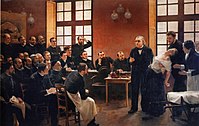
Photo from wikipedia
Many shift workers have an inability to sleep during the daytime following a night shift not due to insomnia or lack of sleep pressure, but because a circadian signal promoting… Click to show full abstract
Many shift workers have an inability to sleep during the daytime following a night shift not due to insomnia or lack of sleep pressure, but because a circadian signal promoting wakefulness is hampering their ability to maintain sleep. We have previously hypothesized that the neuropeptide hypocretin-1 is, in part, responsible for the physiologic expression of this circadian wake signal. As such, it was our intent to determine whether a pharmacologic blockade of hypocretin would enable shift workers to obtain more daytime sleep. Nineteen shift workers took part in a placebo-controlled, double-blind field study of suvorexant. Following two weeks of baseline, participants received 10 mg suvorexant/placebo for one week and were titrated upward to 20 mg suvorexant/placebo for an additional two weeks. Subjective (diaries) and objective (actigraphy) sleep were monitored throughout. No restrictions were placed on participants’ schedules. Both subjective and objective measures of total sleep time significantly improved in the active vs. the placebo condition, increasing by 2.08 ± 0.47 hours (diary) or 1.04 ± 0.53 hours (actigraphy) by the end of the 10 mg condition, and increasing by 2.97 ± 0.56 hours (diary) or 2.16 ± 0.75 hours (actigraphy) by the end of the 20 mg condition. Physician ratings of change in the severity of symptoms similarly improved in the active group. There were no adverse events reported in the active condition. Robust changes in total sleep time were observed after administration of suvorexant, a dual-hypocretin antagonist, prior to daytime sleep in a field study of shift workers. The very large changes in total sleep time, coupled with the permissive nature of the therapeutic mechanism (i.e., suppressing wake rather than inducing sleep) indicate that this could be a viable and important therapy for shift workers. Merck Sharpe and Dohme investigator-initiated study #53236
Journal Title: Sleep
Year Published: 2020
Link to full text (if available)
Share on Social Media: Sign Up to like & get
recommendations!